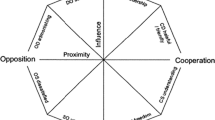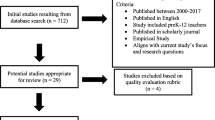Abstract
Professional development in teaching is a critical component of ongoing work to improve student learning outcomes in higher education, especially STEM education. While there are many large-scale professional development programs designed to help participants change the way STEM is taught, few have thoroughly evaluated the outcomes to determine whether faculty members have adopted new techniques and transferred what they learned to their teaching practice. Importantly, without substantive assessment of long-term professional development outcomes, we are left with little evidence of program effectiveness. In this article we examine the current state of professional development evaluation in STEM higher education, propose possible study design elements to use when investigating the impact of professional development on instructors, and describe a novel longitudinal research design for the evaluation of professional development activities.

Similar content being viewed by others
References
Amundsen, C., & Wilson, M. (2012). Are we asking the right questions? A conceptual review of the educational development literature in higher education. Review of Educational Research, 82, 90–126.
Austin, A.E. (2011). Promoting evidence-based change in undergraduate science education. Washington, DC: National Academies National Research Council.
Austin, A. E. (1996). Institutional and departmental cultures: The relationship between teaching and research. New Directions for Institutional Research, 1996(90), 57–66.
Bloom, H. S., Michalopoulos, C., & Hill, C. J. (2005). Using experiments to assess nonexperimental comparison-group methods for measuring program effects. In H. S. Bloom (Ed.), Learning more from social experiments: Evolving analytic approaches (pp. 173–235). New York, NY: Russell Sage Foundation.
Borrego, M., & Henderson, C. (2014). Increasing the use of evidence-based teaching in STEM higher education: A comparison of eight change strategies. Journal of Engineering Education, 103, 220–252.
Brewer, C. A., & Smith, D. (2011). Vision and change in undergraduate biology education: A call to action. Washington, DC: American Association for the Advancement of Science.
Brownell, S. E., & Tanner, K. D. (2012). Barriers to faculty pedagogical change: Lack of training, time, incentives, and tensions with professional identity? CBE Life Sciences Education, 11, 339–346.
Burdick, D., Doherty, T., & Schoenfeld, N. (2015). Encouraging faculty attendance at professional development events. To Improve the Academy, 34, 367–405.
Campbell, C. M., & O’Meara, K. A. (2014). Faculty agency: Departmental contexts that matter in faculty careers. Research in Higher Education, 55, 49–74.
Chalmers, D., & Gardiner, D. (2015). Studies in educational evaluation: An evaluation framework for identifying the effectiveness and impact of academic teacher development programmes. Studies in Educational Evaluation, 46, 81–91.
Connolly, M. R., Lee, Y. G., & Savoy, J. N. (2018). The effects of doctoral teaching development on early-career STEM scholars’ college teaching self-efficacy. CBE Life Sciences Education, 17, ar14.
Connolly, M. R., & Millar, S. B. (2006). Using workshops to improve instruction in STEM courses. Metropolitan Universities, 17, 53–65.
Cook, T. D., Shadish, W. R., & Wong, V. C. (2008). Three conditions under which experiments and observational studies produce comparable causal estimates: New findings from within-study comparisons. Journal of Policy Analysis and Management, 27, 724–750.
Derting, T. L., & Ebert-May, D. (2010). Learner-centered inquiry in undergraduate biology: Positive relationships with long-term student achievement. CBE Life Sciences Education, 9, 462–472.
Derting, T. L., Ebert-may, D., Henkel, T. P., Maher, J. M., Arnold, B., & Passmore, H. A. (2016). Assessing faculty professional development in STEM higher education: Sustainability of outcomes. Science Advances, 2, e1501422.
Desimone, L. M. (2009). Improving impact studies of teachers’ professional development: Toward better conceptualizations and measures. Educational Researcher, 38, 181–199.
Ebert-May, D., Derting, T. L., Henkel, T. P., Maher, J. M., Momsen, J. L., Arnold, B., & Passmore, H. A. (2015). Breaking the cycle: Future faculty begin teaching with learner-centered strategies after professional development. CBE Life Sciences Education, 14, ar22.
Ebert-may, D., Derting, T. L., Hodder, J., Momsen, J. L., Long, T. M., & Jardeleza, S. E. (2011). What we say is not what we do: Effective evaluation of faculty professional development programs. BioScience, 61, 550–558.
Entwistle, N., McCune, V., & Hounsell, J. (2002). Approaches to study and perceptions of university teaching–learning environments: Concepts, measures and preliminary findings. Edinburgh, Scotland: Enhancing Teaching-Learning Environments in Undergraduate Courses Project, University of Edinburgh, Coventry University, and Durham University.
Fraenkel, J. R., Wallen, N. E., & Hyun, H. H. (2011). How to design and evaluate research in education. New York, NY: McGraw-Hill Humanities/Social Sciences/Languages.
Freeman, S., Eddy, S. L., McDonough, M., Smith, M. K., Okoroafor, N., Jordt, H., & Wenderoth, M. P. (2014). Active learning increases student performance in science, engineering, and mathematics. Proceedings of the National Academy of Sciences, 111, 8410–8415.
Garet, M. S., Porter, A. C., Desimone, L., Birman, B. F., & Yoon, K. S. (2001). What makes professional development effective? Results from a national sample of teachers. American Educational Research Journal, 38, 915–945.
Gast, I., Schildkamp, K., & van der Veen, J. T. (2017). Team-based professional development interventions in higher education: A systematic review. Review of Educational Research, 87, 736–767.
Gormally, C., Evans, M., & Brickman, P. (2014). Feedback about teaching in higher ed: Neglected opportunities to promote change. CBE Life Sciences Education, 13, 187–199.
Guskey, T. R. (2002). Professional development and teacher change. Teachers and Teaching: Theory and Practice, 8, 381–391.
Hall, G. E., & Hord, S. M. (1987). Change in schools: Facilitating the process. New York, NY: State University of New York Press.
Handelsman, J., Ebert-May, D., Beichner, R., Bruns, P., Chang, A., DeHaan, R.,...Wood, W.B. (2004). Policy forum: Scientific teaching. Science, 304, 521–522.
Hearn, J. C., & Anderson, M. S. (2002). Conflict in academic departments: An analysis of disputes over faculty promotion and tenure. Research in Higher Education, 43, 503–529.
Henderson, C., Beach, A., & Finkelstein, N. (2011). Facilitating change in undergraduate STEM instructional practices: An analytic review of the literature. Journal of Research in Science Teaching, 48, 952–984.
Hines, S. R. (2015). Setting the groundwork for quality faculty development evaluation: A five-step approach. The Journal of Faculty Development, 29, 5–12.
Hines, S. R. (2017). Evaluating centers for teaching and learning: A field-tested model. To Improve the Academy, 36, 89–100.
Hurney, C. A., Brantmeier, E. J., Good, M. R., Harrison, D., & Meixner, C. (2016). The faculty learning outcome assessment framework. The Journal of Faculty Development, 30, 69–77.
Katz, D., & Kahn, R. L. (1978). The social psychology of organizations. New York, NY: John Wiley & Sons.
Kirkpatrick, D. L. (1959a). Techniques for evaluating training programs. Journal of the American Society for Training and Development, 13, 3–9.
Kirkpatrick, D. L. (1959b). Techniques for evaluating training programs: Part 2-learning. Journal of the American Society for Training and Development, 13, 21–26.
Kirkpatrick, D. L. (1960a). Techniques for evaluating training programs: Part 3-behavior. Journal of the American Society for Training and Development, 14, 13–18.
Kirkpatrick, D. L. (1960b). Techniques for evaluating training programs: Part 4-results. Journal of the American Society for Training and Development, 14, 28–32.
Kneale, P., Winter, J., Turner, R., Spowart, L., & Muneer, R. (2016). Evaluating teaching development activities in higher education: A toolkit. York, United Kingdom: Higher Education Academy.
Lingoes, J. C. (1968). The multivariate analysis of qualitative data. Multivariate Behavioral Research, 3, 61–94.
Lok, P., & Crawford, J. (1999). The relationship between commitment and organizational culture, subculture, leadership style and job satisfaction in organizational change and development. Leadership and Organization Development Journal, 20, 365–374.
Manduca, C. A., Iverson, E. R., Luxenberg, M., Heather Macdonald, R., McConnell, D. A., Mogk, D. W., & Tewksbury, B. J. (2017). Improving undergraduate STEM education: The efficacy of discipline-based professional development. Science Advances, 3, 1–16.
Peterson, M. W. (1976). The academic department: Perspectives from theory and research. New Directions for Institutional Research, 10, 21–38.
Pfund, C., Miller, S., Brenner, K., Bruns, P., Chang, A., Ebert-May, D.,... Handelsman, J. (2009). Summer institute to improve university science teaching. Science, 324, 470–471.
Phuong, T. T., Cole, S. C., & Zarestky, J. (2018). A systematic literature review of faculty development for teacher educators. Higher Education Research and Development, 37, 373–389.
Piburn, M., Sawada, D., Turley, J., Falconer, K., Benford, R., Bloom, I., & Judson, E. (2000). Reformed teaching observation protocol (RTOP) reference manual. Tempe, AZ: Arizona Collaborative for Excellence in the Preparation of Teachers.
Porter, A. C. (1988). Understanding teaching - a model for assessment. Journal of Teacher Education, 39, 2–7.
Porter, S. R., Whitcomb, M. E., & Weitzer, W. H. (2004). Multiple surveys of students and survey fatigue. New Directions for Institutional Research, 2004, 63–73.
Robinson, O. C. (2014). Sampling in interview-based qualitative research: A theoretical and practical guide. Qualitative Research in Psychology, 11, 25–41.
Saxon, D., Garratt, D., Gilroy, P., & Cairns, C. (2003). Collecting data in the information age: Exploring web-based survey methods in educational research. Research in Education, 69, 51–66.
Seymour, E. (2002). Tracking the processes of change in US undergraduate education in science, mathematics, engineering, and technology. Science Education, 86, 79–105.
Steinert, Y., Mann, K., Anderson, B., Barnett, B. M., Centeno, A., Naismith, L.,...Dolmans, D. (2016). A systematic review of faculty development initiatives designed to enhance teaching effectiveness: A 10-years update: BEME guide no. 40. Medical Teacher, 38, 142–159.
Stes, A., Clement, M., & Van Petegem, P. (2007). The effectiveness of a faculty training programme: Long-term and institutional impact. International Journal for Academic Development, 12, 99–109.
Stes, A., & Hoekstra, A. (2015). Convergence in diversity: Evaluating faculty development across the globe. Studies in Educational Evaluation, 46, 1–3.
Stes, A., Min-Leliveld, M., Gijbels, D., & Van Petegem, P. (2009). The impact of instructional development in higher education: The state-of-the-art of the research. Educational Research Review, 5, 25–49.
Stewart, M. (2014). Making sense of a teaching programme for university academics: Exploring the longer-term effects. Teaching and Teacher Education, 38, 89–98.
Tennill, M. M., & Cohen, M. W. (2013). 9: Assessing the long-term impact of a professional development program. To Improve the Academy, 32, 145–159.
Trigwell, K., & Prosser, M. (2004). Development and use of the approaches to teaching inventory. Educational Psychology Review, 16, 409–424.
Truong, M. H., Juillerat, S., & Gin, D. H. (2016). Good, fast, cheap: How centers of teaching and learning can capitalize in today's resource-constrained context. To Improve the Academy, 35, 180–195.
Walczyk, J. J., Ramsey, L. L., & Zha, P. (2007). Obstacles to instructional innovation according to college sciences and mathematics faculty. Journal of Research in Science Teaching, 44, 85–106.
Walter, E. M., Beach, A. L., Henderson, C., Williams, C. T., & Ceballos Madrigal, I. (2019). Exploring organizational climate for teaching in postsecondary settings: The development and validation of the survey of climate for instructional improvement. Manuscript submitted for publication.
White, R. T., & Arzi, H. J. (2005). Longitudinal studies: Designs, validity, practicality, and value. Research in Science Education, 35, 137–149.
Williams, C. T., Walter, E. M., Henderson, C., & Beach, A. L. (2015). Describing undergraduate STEM teaching practices: A comparison of instructor self-report instruments. International Journal of STEM Education, 2, 18.
Wright, M. C., Goldwasser, M., Jacobson, W., & Dakes, C. (2017). Assessment from an educational development perspective. To Improve the Academy, 36, 39–49.
Acknowledgements
The authors acknowledge funding from the National Science Foundation DUE 1623834 entitled “Collaborative Research: Investigating Contextual Factors that Impact Early-Career Faculty Teaching Practice,” participation from faculty members in the longitudinal study, and support from the departmental faculty and chairs in the participating institutions.
Author information
Authors and Affiliations
Corresponding author
Additional information
Publisher’s Note
Springer Nature remains neutral with regard to jurisdictional claims in published maps and institutional affiliations.
Rights and permissions
About this article
Cite this article
Emery, N., Maher, J.M. & Ebert-May, D. Studying Professional Development as Part of the Complex Ecosystem of STEM Higher Education. Innov High Educ 44, 469–479 (2019). https://doi.org/10.1007/s10755-019-09475-9
Published:
Issue Date:
DOI: https://doi.org/10.1007/s10755-019-09475-9




